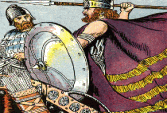1 Samuel
Power Outage
4:1 - 7:14
Ephesians 6:10
Finally, my brethren, be strong in the Lord, and in the power of his might.
KJV
The believer is strong when his allegiance to the Lord is undivided.
Related Reading
Psalm 27
Psalm 121
1 Corinthian 10:1-15
1 John 5:1-5
Revelation 2:1-11
 |
When I was a young child, one of the “in” things was to have a rabbit’s foot. It was a “good luck” charm. Likewise, four-leaf clovers are viewed as “good luck” charms. And what of all those figurines attached to car dashboards and rear seat windows, saints designed to help and protect us as we travel. Or what about the lucky jersey or socks or sweater or other paraphernalia sports stars and coaches wear when on a winning streak? We all want to pull our good fortune from tangible objects. |
Here Comes the Enemy [4:1 - 2]
The Philistines were a coastal “tribe” who apparently migrated to Canaan from the area of Greece. Philistine was not a nation but more properly five strong-hold cities ruled by five separate kings. The cities were Ekron, Ashdod, Ashkelon, and Gaza, all located along the coast, and Gath, which was situated slightly farther inland, southeast of Ashkelon (see map). The kings would frequently unite as a single front in dealing with the Israelites.
 |
Judges 13:1 records that God used the Philistines as a thorn in the side of Israel for many years. This period commenced during the life of Samson. |
The scriptural account of the first battle with the Israelites is brief (4:1,2). The Nation comes out on the short-end of the stick. Immediately, the elders raise the question, “Why?” In the mind of the Israelites, a loss in battle was an indication that God was displeased. Complete obedience to God’s ethical and religious demands was a necessity of life, peace, and prosperity for the Israelites. The question raised by the elders was, therefore, the legitimate question.
The last time you suffered misfortune, did you seek God for help in understanding the misfortune? Did you ask what you should learn from the experience? |
Good Luck Charm [4:3 - 9]
 |
Well, not exactly, although a quick reading of 4:3-10 might produce that conclusion. The elders quickly decide that the Ark of the Covenant should be brought from Shiloh to assist in the battle against the Philistines. The arrival of the Ark in the Israelite camp produces great joy. The Philistines, hearing the shouts of acclamation, suffer a moment of panic and fear. So, against this enemy, the army of Israel, lead by the Ark and Eli’s two sons, Hophni and Phinehas, as the priests attending the Ark, go forth to meet the army of the Philistines.
|
 |
The Ark of the Covenant and the Tabernacle of God in which the Ark is housed is a study unto itself. The Ark is the seat of God. There at the Tent or Tabernacle of Meeting God Himself sits upon the Ark. There God met with Moses “face-to-face” (Exod 33:11). The Ark was ever present in the Wilderness. The Ark led the assault upon Jericho. Please refer to the appendix of this chapter for a more detailed discussion of the Ark of the Covenant and the Tabernacle. |
Good luck charm or God’s presence?
The context of chapter 4 strongly suggests a positive attitude on the part of the elders in bringing the Ark to Ebenezer. It is almost surprising they had not done so earlier, before the first battle. Yet, a reading of the account leaves an impression of good luck charms. The Jew’s recognized that God is the power behind their victories and defeats. They have not relied upon him in a consistent manner for many years (review the book of Judges). The priests are not acting in God’s will as we reviewed last week. So, why bring the Ark to the battle?
The Jewish Nation believed God was present with the Ark and by bringing the Ark to Ebenezer, the Nation was bringing God to the battle. He would now lead them. To this extent, the Ark has become a good luck charm, for there seems to be no true repentance or effort made to find the root cause of God’s displeasure.
There Goes the Glory [4:10 - 22]
| The second battle with the Philistines is a disaster. Hophni and Phinehas are both killed, along with some thirty thousand Jewish soldiers. And worse, the Ark of the Covenant is captured by the Philistines! The presence of the Lord is removed from Israel. The army effectively disbands as “every man fled to his tent” (4:10). Israel is in disarray. |  |
God is faithful and true to keep His promises, whether such promises are good or bad from our point of view. Eli’s death occurs despite his immediate concerns for the Ark of the Covenant (4:18). God had judged the entire family earlier (2:27-36) and the length of time which has passed since the prophecy does not detract from the execution of His judgment. This can be both a hope and a warning to all of us. Obedience to God is found in our love for Him and our desire to perform His will in all things. This is a condition of the our heart. Does God rule our lives? Or are we too tied into the world system? Eli and his sons were part of the world, notwithstanding their service in the house of the Lord.
How often do we seek God’s victory over a problem, knowing we have other sin in our lives? Who controls the throne of your life?
|
|
 |
The glory has departed from Israel. The naming of Eli’s grandson Ichabod, meaning “no glory” or “the glory has departed,” reflects this condition (4:19-22). At the same time, Eli’s death reflects a word-play. When Eli is described as “heavy” in the KJV, the Hebrew word can mean physical weight or a place or position of honor. Eli was both. What is more, he was well fed because he participated in his son’s abuse of their priestly position. Ichabod’s name may have reflected the departure of God’s glory because of the loss of the Ark of the Covenant, but the real power of God had departed long before as Eli and his sons profaned God’s Tabernacle and laws. In New Testament terms, Eli and his sons had so grieved and quenched the power of the Holy Spirit that they were unable to discern the loss of God’s power. One is reminded of Samson’s similar position on the lap of Delilah.
|
| Is there sin in your life which has robbed you of a discernment of God’s presence? |
Sin versus God [5:1 - 12]
Sin does not overcome God’s power. God is always in control. He usually chooses not to exercise His power in our favor when we walk out of fellowship with Him. But the power is still present. Chapter 5 reminds us of the battle between God and Egypt prior to the Exodus. There God’s plagues were each directed at one of the many Egyptian gods. In each instance, the God of Abraham, Issac, and Jacob prevailed. The Philistines soon experienced this same power.
The Ark is placed in the Temple of Dagon in some sort of subservient position. Two nights in a row, the Philistine god Dagon falls flat on his face in the presence of the Ark of the Covenant. The second night witnesses the detaching of arms and head as well. The Philistines quickly learn their god is no match for the God of the universe. Further, the people of the city are struck with “emerods” (tumors or boils). In an effort to avert a plague, the Ark is moved from one Philistine city to the next, all for no avail. The Philistine leaders understand the need to rid themselves of the Ark so that God does not “slay us and our people” (5:10)
| The god of the Philistines needed the peoples’ help to be righted on his stand (5:3). What kind of “god” is this that man must carry him and care for him? God is to be the supreme one, above all others. How often do we allow the “things” of our lives to become our masters? How many of those “things” which we must carry around rule our every thought, desire, want, and action? In our sane moments, we know we control all of our material possessions. Why, then, do they control our lives? |
| Amazing, the Philistine priests understand the concepts of the Jewish religion, but not its true intent. The priests prepare a “guilt offering” to Israel’s God, but do so using images of gold. God must be pleased with the concept of the guilt offering but dismayed at the improper mode of worship. This “head” knowledge is of little benefit to the Philistines, just as a head knowledge of Jesus Christ is useful only if it leads to a heart knowledge. How many of the cults of modern society are just like the Philistines? They give lip service to Jesus, but then fail to appreciate and understand His true position and relationship to them and the world. In fact, isn’t it strange how many of the cults feel compelled to address the issue of Jesus. If I had found the “true” god, why should I take time to explain who those “other gods” are? Should not I just go about preaching my god so that I could win people to him? Yet, the cults all seemed compelled to downplay the role of Jesus. Could it be because deep down they know He is God Incarnate? The devils know there is one true God and tremble (James 2:18). So do the cults – only they don’t want to tell us they know! |  |
How do you feel when you are out there worshiping a false god or idol – be it power or a person or material items? Don’t you feel God’s true presence nibbling at the corners of your conscience demanding attention? |
God is not an idol that He should be worshiped like the pagan idols (see Isaiah 40:18-26; 46:1-5).
This is the point not understood by the Philistines. This is the point so many of us miss today. Christianity is not a religion but a relationship – a relationship of man to his perfect, all-powerful God. Adam walked with God in the cool of the garden. Don’t you look forward to the chance for this opportunity?
Of Joy And Sorrow [6:1 - 21]
Rejoice O Israel, the Ark has come home! (Chapter 6). But it brings with it peculiar results. Modern Christian society has developed this notion of a New Testament God of love. They see Him as being different from the Old Testament God of wrath and destruction. Modern society is much like the Philistines. The modern church frequently mixes biblical concepts with worldly concepts to produce a new method of worshiping God. We overlook the fact this has been tried in the Old Testament with poor results. This view misses the unity of Scripture and displaces the true picture of God with a painting produced by mankind after his own desires. Scripture teaches that all sin has some consequence. Forgiveness may occur, but the consequence remains. If God delays the consequence, rejoice and feel blessed. If the consequence arrives suddenly, do not be surprised or disappointed.
The Jews of Beth Shemesh broke God’s worship rules in several ways (6:18,19):
✞ Sacrifices were to be perfect male animals, not new nursing mother cows.
✞ The Ark was to be kept in the Holy of Holies of the Tabernacle, not out in the open on top of a rock.
✞ The people were not suppose to look on or in the Ark.
The people of Beth Shemesh worship God in all the wrong ways. And God’s punishment was swift and severe! While there is confusion (or, at least, a question about) the Hebrew text, it seems best to accept the fact that 50,070 Israelites perished that day because they failed to follow God’s prescribe methods of worship.
How many more will perish because they fail to understand the force of Jesus’ Words? (Jn 14:6) Have you accepted Christ as Lord and Savior? If not, this is the day of salvation! |
Repentance and Victory [7:1 - 14]
The Levites are called and the Ark is sent forth from Bethshemesh to the house of Abinadab on the hill, Eleazar his son is consecrated to keep the ark of the LORD. For the next 20 years, there will be no “rabbit’s foot” in which the Israelites can place their trust. They will have to trust in God Himself, as assisted by Samuel, their prophet, priest, and judge. All this will be done without the help of any outward object upon which the Nation may focus. All this sounds a lot like the plight of the Christian. Christ, the object of our affection and the source of our strength and power, is out of sight in heaven. We have to draw upon Him in faith. We have to walk by faith and not by sight!
How well are you doing that? Or do you yearn for the presence of the Ark? |
|
 |
Why did the Ark not go back to Shiloh? Scripture does not specifically tell us the answer to this question, but the best analysis of the Scriptures strongly supports the contention that Shiloh had been destroyed by the Philistines during these battles. There may have been no city left to which to take the Ark. Either way, God wanted the Ark out of circulation. If the Israelites thought too highly of it, as a kind of magic instrument, then God will simply take it out of operation, and this He does. |
Twenty years pass between First Samuel 7:2 and 7:3. Samuel’s absence from the preceding chapters is noticeable, yet, not explained. Now, the prophet returns to the forefront of Israel worship, and his call is not for a return of the Ark, but a return of the Nation to God by prayer, humility, and worship. The revival has begun. God does not work through good luck charms or through magical spells, but through the power of His people who turn to Him in true worship.
The effect of Samuel’s call is a cleansing of the land. The false gods are put away and the people consecrate themselves to the Lord.
 |
Earlier we encountered the foreign god Dagon. Here the text refers to the foreign gods of Baalim and Ashtaroth. Dagon was originally believed to be a “fish god” because the term “dag” means “fish.” Later research suggests that Dagon was some kind of agricultural god, since the term “Dagon” means grain. Baal is the Canaanite deity also known as Hadad, the storm-god, thus, the male god of fertility and the most important deity in the Canaanite pantheon. Baalim, used in the Samuel text is merely the plural name of Baal. Such usage shows both the polytheistic nature of Canaanite religion and suggests the general concept that the Israelites were guilty of pursuing foreign “gods” as opposed to the one true God of Abraham. It is not clear to what extent local Baals were equated with or distinguished from Hadad. Ashtaroth was the mother goddess with aspects as the goddess of fertility, love and war. |
This time the Jews must face the Philistines without their beloved Ark. The “rabbit’s foot” is out of reach. Reliance instead rests solely on the power of God. Once again, the Lord shows Himself superior by bringing “a great thunder” upon the Philistines (7:10). The enemy ran in panic, only to be pursued and overcome by the Israelites. Reliance upon the Lord was justified, as once again the cycle seen Judges as discussed in the Introduction plays out in this later historical book.
 |
Ebenezer, the town involved in many of these episodes, means “stone of help.” Samuel once again creates another memorial for the Nation to use as a reminder of the deliverance offered by the Lord. How often the Jews collect such memorials over the course of Old Testament Scripture. Yet, how often do the Jews continue to turn from God and place their own self-pride at the forefront of their decisions. Christ is our “rock,” our foundation through life (Deut 32:3,4; Matt 7:24-27).
|
How many spiritual memorials do you have? Do you pay attention to them? |
God is gracious and sovereign. He hates sin and judges it, but in doing so, He seldom walks or acts in the ways which we expect or predict. We must learn how to lean solely upon God and not allow anything to become our “ark.” Man too frequently yearns for the good luck charm. Many of the religions of the world, particularly those of the East, present a fatalistic attitude similar to Eli’s. “God” will do what god wants to do and who are we to stop him? How different to this view is the response of Samuel and similar teachings of the Bible?
Revival comes only when we recognize who God truly is. God will frequently allow events in our lives to overrun us. These tests are designed to prove to us the sovereignty and control which God exercises. God ordains a particular series of events to occur in our lives in order to develop a deep sense within us of God’s holiness. This sense should be accompanied by a deep reverence for God. This combination should produce within us an overwhelming sorrow at the magnitude of our sin and our unworthiness before our holy God. When the Nation turned to God and away from their own sinful folly, God provided victory. When we turn away from our sin, God provides the path back to Him.
 |
If my people, which are called by my name, shall humble themselves, and pray, and seek my face, and turn from their wicked ways; then will I hear from heaven, and will forgive their sin, and will heal their land. 2 Chronicles 7:14 |
![]()
 |
God must be first and foremost in our lives. This is the lesson learned by the Israelites in these chapters. Samuel’s task as judge is to bring the National society into conformity with the Lord’s desire for their collective life. Is this not the same task we each face every day of our lives? |
How are you handling God’s demands upon you to place Him first in all aspects of your life? Is Jesus at the center of all you do? |
